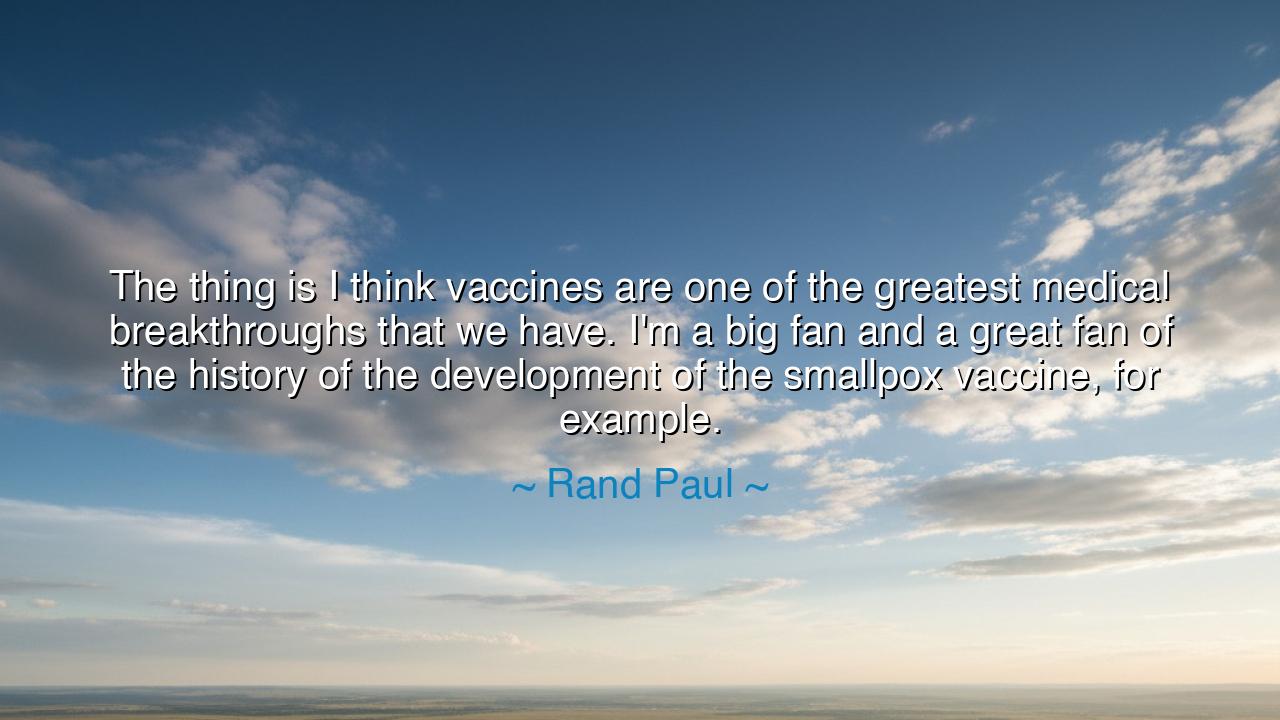
The thing is I think vaccines are one of the greatest medical
The thing is I think vaccines are one of the greatest medical breakthroughs that we have. I'm a big fan and a great fan of the history of the development of the smallpox vaccine, for example.






"The thing is, I think vaccines are one of the greatest medical breakthroughs that we have. I'm a big fan and a great fan of the history of the development of the smallpox vaccine, for example." These words by Rand Paul illuminate a profound truth: the invention and development of vaccines stand as one of humanity’s most heroic triumphs in the fight against disease. Vaccines have saved countless lives, and their ability to prevent illness has shaped the course of history. As Rand Paul reflects on the smallpox vaccine, he draws our attention to one of the most pivotal moments in medical history—an example of human ingenuity and perseverance that has left an indelible mark on our world.
In the ancient world, the struggle against disease was a constant battle. Civilizations such as the Egyptians, Greeks, and Romans were all familiar with the devastating effects of disease, but without the advanced understanding of microbiology and immunology that we have today, they could only rely on rudimentary treatments. Hippocrates, often regarded as the father of modern medicine, understood that health was intertwined with the environment and lifestyle, yet he lacked the knowledge of germs or bacteria. Despite this, his work laid the foundation for systematic medical inquiry. However, it was only much later, in the age of enlightenment and beyond, that humans would begin to unravel the mysteries of disease and discover that prevention, not just cure, could change the course of health forever.
The smallpox vaccine—which Edward Jenner pioneered in the late 18th century—was one of the first true breakthroughs in preventative medicine. Jenner, in observing that milkmaids who contracted cowpox did not seem to suffer from smallpox, began to experiment with the idea that a related, less harmful disease could provide immunity to the more deadly one. In 1796, Jenner tested his hypothesis by injecting a boy with cowpox and later exposing him to smallpox, finding that the boy did not contract the disease. This was the birth of vaccination, a concept that would go on to save millions of lives and, in the 20th century, eradicate smallpox completely. Jenner’s discovery was a momentous leap forward in human health—it provided the first evidence that disease prevention was possible, not merely through treatment, but through preparation and immunization.
Much like the ancient philosophers who sought to understand the nature of the human body and its relationship with the world, Jenner’s work helped us understand that health is not just about treatment but about prevention. The ancient concept of balance between the elements—earth, air, fire, and water—was a rudimentary understanding of maintaining health. Jenner’s insight, however, demonstrated that health could be maintained through active intervention—not by changing the elements of the body, but by preparing the body’s defenses. His discovery demonstrated that we can shape our future health not just by reacting to disease but by actively preventing it.
In the centuries following Jenner’s discovery, vaccines became the cornerstone of modern public health. The smallpox vaccine was not just an isolated event but part of a broader movement that included the development of vaccines for polio, measles, and tuberculosis—each representing a major triumph in the fight against infectious disease. As we look to these milestones, we see the profound impact of vaccines on global health—how they have changed the landscape of disease, turning once-lethal threats into manageable conditions or eliminating them entirely. These medical breakthroughs are a testament to human ingenuity and the power of knowledge, demonstrating that through science, we can confront nature’s greatest challenges.
The lesson we draw from Rand Paul’s words, and from the long history of vaccine development, is that human progress often emerges from the willingness to question, experiment, and innovate. Vaccines were not the result of chance, but of persistent observation and a dedication to understanding the natural world in ways that could benefit all of humanity. Today, vaccines continue to be a symbol of hope and scientific achievement. As we face new challenges in the form of emerging diseases, such as COVID-19, the same spirit of innovation and collaboration that led to the creation of the smallpox vaccine is essential.
In our own lives, we must recognize that science and progress are not just theoretical ideals but practical forces that shape the well-being of societies. Just as Jenner, Pasteur, and countless other scientists have given us the gift of life-saving vaccines, we too must champion knowledge, curiosity, and prevention in our approach to health. We should embrace the wisdom of the past while forging ahead with new discoveries that will protect future generations. Just as the ancients sought to understand the human body, let us continue to seek deeper understanding and work toward a future where disease and suffering are not inevitable, but preventable. In honoring the legacy of Jenner’s work, let us move forward with the confidence that science can guide us to a healthier, more equitable world.






AAdministratorAdministrator
Welcome, honored guests. Please leave a comment, we will respond soon